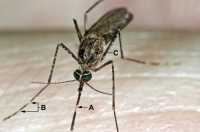Author Interviews, Infections, JAMA / 01.05.2019
West Nile Virus: Lag Time in Reporting Precludes Accurate Public Health Decisions
MedicalResearch.com Interview with:
Nicholas B. DeFelice, PhD
Department of Environmental Medicine & Public Health
Icahn School of Medicine at Mount Sinai
New York, New York
MedicalResearch.com: What is the background for this study? What are the main findings?
Response: Effective allocation of public health resources during an outbreak is complicated and often reactive. Thus, it is important that we develop quantitative tools that can accurately and rapidly forecast the progression of an outbreak and provide decision support. Recently, several advancements have been made in the realm of infectious disease forecasting: it is a field that is growing in exciting directions. However, for these forecasting tools to work in real time, we must understand how the forecasting apparatus and observational network work in real time to ensure they are sufficient to support accurate operational predictions.
We previously showed that accurate and reliable forecasts of West Nile virus outbreaks can be made using surveillance data and a mathematical model representing the interactions between birds, mosquitoes and risk of human spillover. This model system was able to retrospectively forecast mosquito infection rates prior to the week of peak mosquito infection, and to forecast accurately the seasonal total number of human West Nile virus cases prior to when the majority of cases were reported.
For this study, we were interested in the data flow process and the question of whether appropriate infrastructure is in place to support real time forecasting. If this forecast system were made operational in real time, public health officials would have an evidence-based decision-support tool to help
1) actively target control of infected mosquito populations (i.e., larviciding and adulticiding),
2) alert the public to future periods of elevated West Nile virus spillover transmission risk, and
3) identify when to intensify blood donor screening. (more…)


